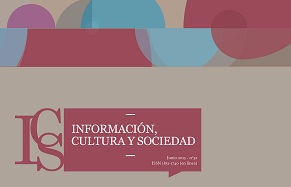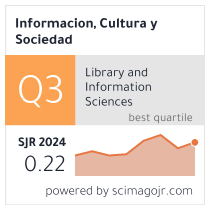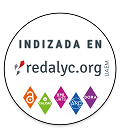Multiplicity and ambivalence: New joints in Librarianship and Information Science
Abstract
The present work reproduces the inaugural conference of the 48º Reunión Nacional de Bibliotecarios “Bibliotecarios: integración, identidad regional y abordaje transversal” organized by the Asociación de Bibliotecarios Graduados de la República Argentina (ABGRA) in April 2016. It introduces several issues of prime importance for Librarianship and Information Science. The following matters, among others, are taken into account: Multiplicity of approaches to the discipline within an ambivalent framework; new problems of interpretation as a result of the “technological spatialities”; the topic focused on the nomination, professional identity and training; reflection on epistemological, ethical and axiological aspects of the librarian theory and praxis; and the sometimes hidden topic of socio-political entanglements in the realities of our field. Finally, on the basis of the previous issues and within the frame of our postmodern societies, a series of conceptualizations and thoughts are preliminarily outlined.Downloads
References
Baker, Kim. 2013. Information literacy and cultural heritage: developing a model for lifelong learning. Oxford, UK: Chandos Publishing.
Bauman, Zygmunt. 2003. Modernidad líquida. Buenos Aires: Fondo de Cultura Económica de Argentina.
Bauman, Zygmunt. 2013. La cultura en el mundo de la modernidad líquida. Buenos Aires: Fondo de Cultura Económica de Argentina.
Buckland, Michael. 2012. What kind of Science can Information Science be? En Journal of Information and Technology. Vol. 63, no. 1.
Budd, John M. 2008. Self-examination: The present and future of Librarianship. Westport, CT: Libraries Unlimited.
Cansanello, Oreste Carlos. 2008. Ciudadano/vecino. En Goldman, Noemí, ed. Lenguaje y revolución: con-ceptos políticos clave en el Río de la Plata, 1780-1850. 2ª. ed. Buenos Aires: Prometeo Libros. p. 19-34.
Fiels, Keith Michael. 2011. A library “state of the state”: trends, issues, and myths. En Advances in Libra-rianship. Vol. 34, 3-17.
García Canclini, Néstor. 2012 [2001]. Culturas híbridas. Estrategias para entrar y salir de la modernidad. Buenos Aires: Paidós.
Hjørland, Birger. 2000. Library and Information Science: practice, theory, and philosophical basis. En Information Processing and Management. Vol. 36, 501-531.
Jameson, Fredric. 2010 [1998]. El giro cultural: escritos seleccionados sobre posmodernismo. 1983-1998. Buenos Aires: Manantial.
Marx, Karl. 1995. El dieciocho Brumario de Luis Bonaparte (1852). Montevideo: Ediciones de la Comuna.
Parada, Alejandro E. 2015. Espacialidad y bibliotecas. Hacia una breve tipología del espacio bibliotecario. En Información, cultura y sociedad. No. 33, 5-10.
Samek, T. 2008. Biblioteconomía y derechos humanos: una guía para el siglo XXI. Gijón: Trea.
Sassen, Saskia. 2010. Territorio, autoridad y derechos. De los ensamblajes medievales a los ensamblajes globales. Buenos Aires: Katz Editores.
Sassen, Saskia. 2012 [2007]. Una sociología de la globalización. Buenos Aires: Katz Editores.
Shannon, C. E. y W. Weaver. 1962. The Mathematical Theory of Communications. Urbana: University Press.
Wallerstein, I., coord. 2011 [1996]. Abrir las ciencias sociales. Informe de la Comisión Gulbenkian para la reestructuración de las ciencias sociales. México: Siglo XXI editores.
Authors publishing in this journal acknowledge the conditions below:
- Authors retain the copyright of their work while they transfer the right of the first publishing to the journal, under the Creative Commons Attribution-ShareAlike 4.0 International (CC BY-SA 4.0) Licence, which allows third parties to reproduce them under the condition that express mention is given to the author and to its original publication in the journal.
- Authors may enter into other contractual and independent arrangements for the non-exclusive distribution of the version of the article published in this journal (for instance, it can be published in an institutional repository or in a book). In any case, an express mention should be given to its first publication in the journal.
- It is permitted and encouraged to publish online the articles (for example, on institutional or personal pages).


























